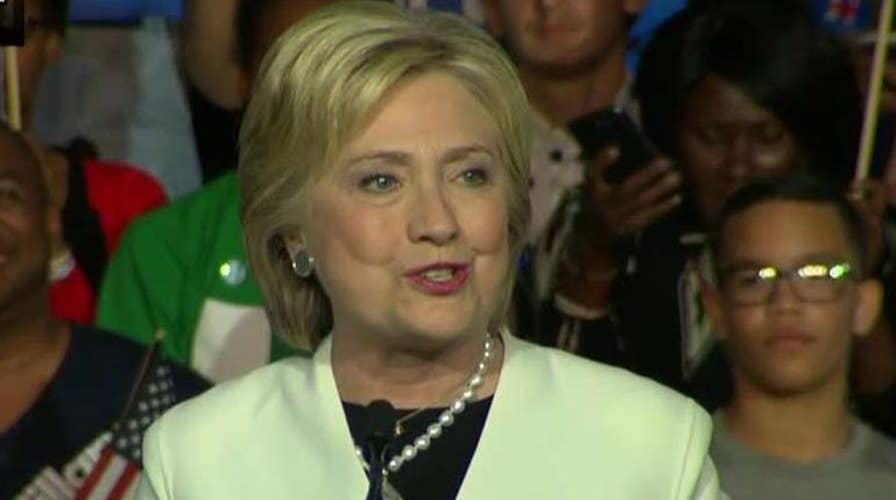Hillary Clinton: America never stopped being great
Democratic presidential frontrunner speaks to supporters, takes aim at Donald Trump after strong Super Tuesday showing
Hillary Clinton had a Super Tuesday, winning seven of eleven states. In her victory speech, she promised to “Make America Whole,” slamming Donald Trump for dividing the country.
The New York Times was practically giddy with relief that Clinton had triumphed, thus kneecapping the quixotic but popular Bernie Sanders.
The Times was equally joyous to report a “deep chasm” dividing the GOP, claiming the Republican Party was “falling apart.”
Nowhere did the Times mention the most stunning aspect of the primary season to date. Far from falling apart, GOP participation is growing like topsy, while the number of people turning out to vote Democratic has cratered.
In Texas, about 2.8 million Republicans turned out, about twice the number in 2012. That’s in sharp contrast to the Democrats, where 1.4 million votes were cast, about half the number in 2008.
In Massachusetts, nearly 20,000 voters quit the Democratic Party in order to sign up for the GOP. In the four first states to vote, the number of participants on the GOP side was ahead by 26 percent, while Democratic turnout was down across the board.
The GOP may be falling apart, but it’s doing so in a growing tent. Ironically, Donald Trump, who has been scorned for dividing the country, appears to be bringing together a disparate group of Americans tired of liberal policies and fed up with government incompetence. They’ve waited for Democrats to fix what’s broken – for nearly 8 years – and now they’re ready to try something new.
And, they don’t like Hillary Clinton. Clinton may be able to beat a 74-year-old Socialist, but running against Donald Trump will be tough. Word is that her camp thinks facing off against Trump will be a walk in the park. Her husband, who has keen political instincts, knows better.
One warning shot comes from a recent CNN/ORC International poll. Though the survey suggests that Hillary is her party’s preferred candidate – by a margin of 55 percent to 38 percent over Bernie Sanders – it also reveals an “enthusiasm gap” wide enough to drive a houseboat through. This is her challenge.
When asked the question “Compared to previous elections, are you more enthusiastic about voting than usual, or less enthusiastic?” Forty-six percent of registered Democrats said “more enthusiastic” while 42 percent said they were less pumped up. In November 2007, by comparison, 68 percent of Democrats, ecstatic about the possibility of dumping George W. Bush and about Barack Obama’s candidacy, answered that they were more enthusiastic, while only 24 percent said they were less so. The readings are the worst since 2000.
Drilling down, women are overall less excited about this election, as are minorities. The folks most enthusiastic about voting are males and older Americans. Hillary needs young people, minorities and women to rally to her cause -- the old Obama coalition -- if she is to beat the Republican nominee.
Asking the same question of Republicans, 58 percent say they are more enthusiastic about voting than usual, while only 30 percent responded that they were less excited. Welcome to the Donald Trump effect. Or maybe to the “Seven Years of Obama is Enough” phenomenon.
In this poll, conducted at the end of February, 49 percent of Republicans and right-leaning independents indicate they are behind Trump, the highest level in the past six months. Only 16 percent line up behind Rubio, and 15 percent are for Cruz. This shatters the thought that there were at most 30 to 35 percent of Republicans willing to back the billionaire. It also shatters the previous record of 41 percent set in late January. Trump’s support has gained steadily since mid-September.
However, it’s not all good news for Trump backers. In another question, respondents are asked if they would support a particular candidate, should he be nominated. While 69 percent say they would “definitely” or “probably” support Ted Cruz or Marco Rubio, only 52 percent say they would line up behind Trump. Worse - only 11 percent say they would definitely not support Cruz and 12 percent won’t back Rubio; a full 35 percent say they will definitely not vote for Trump. Trump will have to mend some fences.
By contrast, if Hillary Clinton is the nominee, 65 percent of Democrats and left-leaning independents surveyed say they will definitely or probably support her; only 20 percent say they absolutely will not.
Though Trump walks away with the overall GOP vote, it looks like backers take a more jaundiced view of the tycoon’s capabilities, while still placing him above his rivals. A slim majority (51 percent) of Republicans thinks Trump would be the most effective at solving the country’s problems; Cruz comes in second in the problem-solving department with 17 percent of the poll. As for handling the duties of commander-in-chief, Trump again leads, but with the confidence of less than half of right-leaning voters.
In assessing who’s most honest and trustworthy, Trump only gets 35 percent of the votes, compared to 22 percent for Carson, 14 percent for Cruz and 13 percent for Rubio. After all the charges and counter-charges that the candidates have flung at each other in recent weeks, a lack of credibility is understandable.
Hillary Clinton flunks the character issue by a huge margin: only 36 percent think she is the most honest and trustworthy candidate, compared to 59 percent that credits Sanders with those characteristics.
This is only one poll, but it’s a revealing snapshot. As the campaigns plow onward, positions may change. However, Hillary’s problems with how voters view her honesty and trustworthiness appear durable.
The same may be true of The Donald.
If the country is presented with two flawed candidates, the “enthusiasm gap” could prove decisive.





















